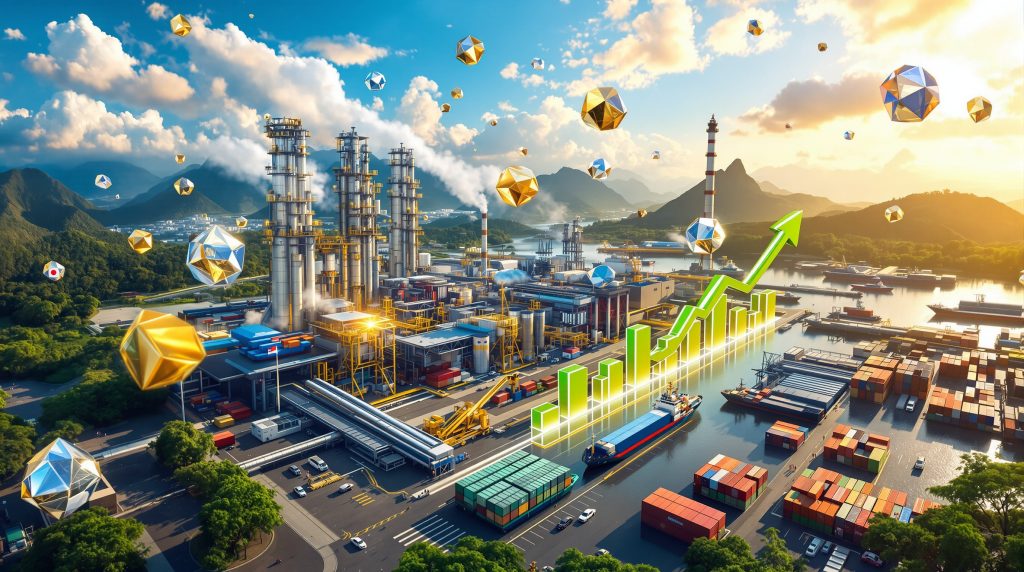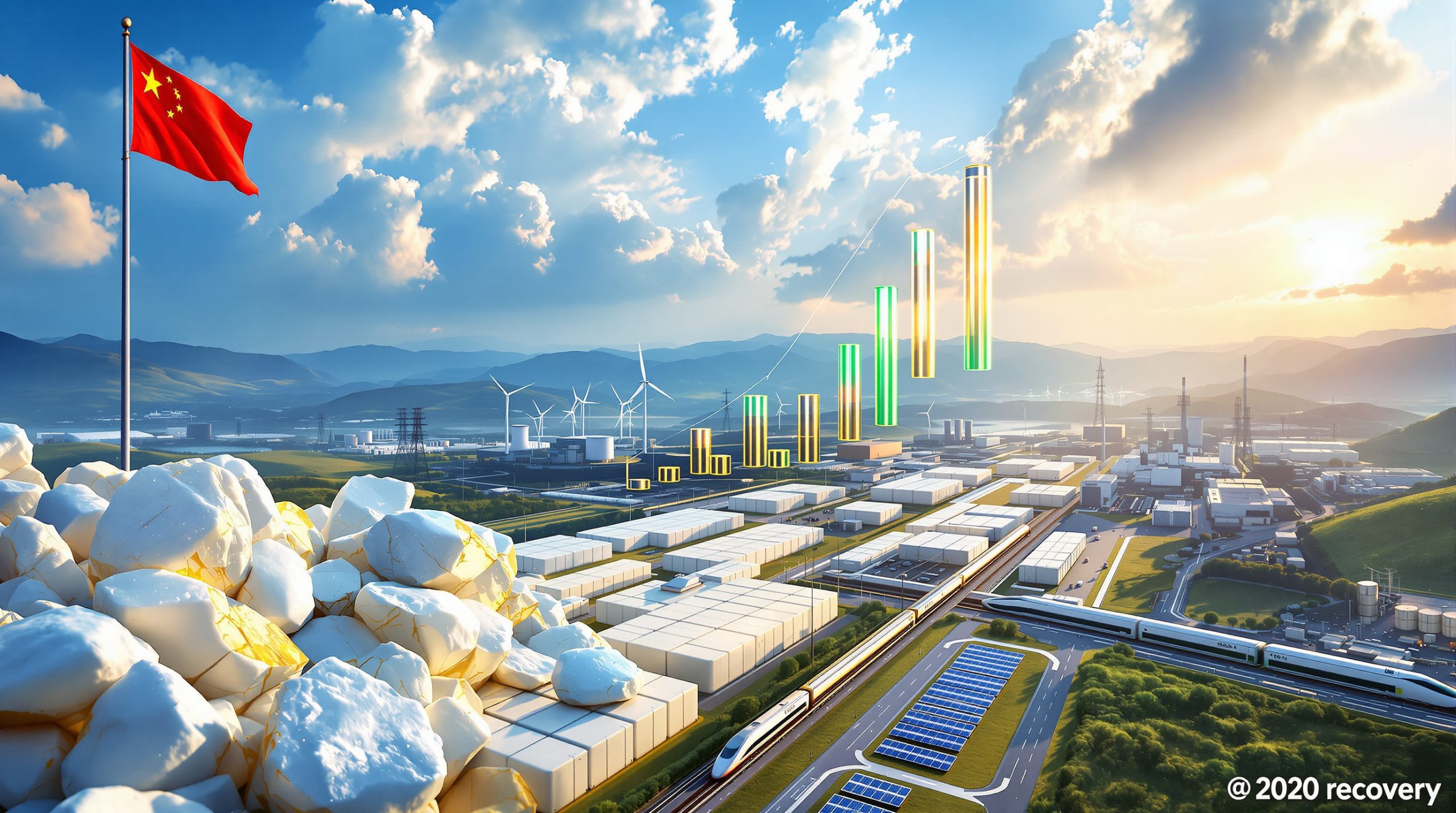Malaysia's Strategic Pivot: Transforming Raw Material Exports into Value-Added Manufacturing
Malaysia's comprehensive prohibition on raw rare earth exports represents a calculated transformation of the nation's resource management strategy. This policy shift moves the country away from traditional commodity extraction toward establishing domestic value-added processing capabilities, fundamentally altering how Malaysia positions itself in global critical minerals markets.
The Southeast Asian nation possesses approximately 16.1 million metric tons of rare earth deposits according to government estimates, yet historically exported these materials in unprocessed form at minimal profit margins. Trade Minister Tengku Zafrul Aziz articulated the strategic rationale behind this transformation, emphasizing Malaysia's determination to move beyond being a country that merely extracts and ships cheap raw materials.
Economic Drivers Behind Malaysia's Export Prohibition
The Malaysia raw rare earth exports ban emerges from decades of witnessing other nations capture the majority of economic benefits from Malaysian mineral wealth. Several key factors motivated this dramatic policy change:
Value Addition Focus: Raw rare earth materials typically generate significantly lower revenues compared to processed products. The policy aims to capture higher profit margins through domestic refinement and manufacturing processes.
Technology Transfer Requirements: Foreign companies seeking access to Malaysian rare earth resources must now establish partnerships that include knowledge sharing and technology transfer agreements. This approach ensures Malaysia develops indigenous processing capabilities rather than remaining dependent on external expertise.
Furthermore, the ban creates incentives for establishing comprehensive processing facilities within Malaysian borders, potentially spawning supporting industries for equipment, maintenance, and logistics services. These mineral beneficiation opportunities demonstrate how raw material restrictions can drive local value creation.
Revenue Optimization: By prohibiting raw material exports, Malaysia forces international buyers to invest in domestic processing infrastructure or purchase higher-value finished products.
The policy framework explicitly encourages foreign investment and technology sharing for mining and processing operations while preventing the export of unprocessed materials that provide minimal economic returns.
Understanding Malaysia's Critical Minerals Landscape
Malaysia's rare earth deposits contain elements essential for modern technology applications, positioning the nation as a potentially significant player in global supply chains. However, the country has historically lacked advanced processing capabilities, leading to raw material exports that captured minimal value from these strategic resources.
Consequently, the critical minerals energy transition has created new urgency around securing reliable supply chains for renewable energy technologies.
Strategic Elements and Applications
| Element Category | Primary Uses | Strategic Importance |
|---|---|---|
| Permanent Magnet Materials | Electric vehicle motors, wind turbines | Critical for clean energy transition |
| High-Performance Magnets | Defense systems, precision equipment | Essential for military applications |
| Electronic Components | LED lighting, laser technology | Vital for electronics manufacturing |
| Display Technologies | Smartphone screens, medical imaging | Crucial for consumer electronics |
The Malaysian government acknowledges that the country currently lacks the technological infrastructure to efficiently mine and process these deposits. This technological gap represents both a challenge and an opportunity, as foreign investment partnerships can provide necessary expertise while ensuring knowledge transfer to Malaysian entities.
International Trade Relationship Impacts
Malaysia's export ban operates within a complex framework of international agreements and diplomatic relationships. The policy specifically targets raw, unprocessed materials while maintaining access to refined products for international markets.
U.S.-Malaysia Critical Minerals Framework
Recent bilateral agreements between Malaysia and the United States demonstrate how the export ban functions within international trade frameworks. During President Donald Trump's visit to Kuala Lumpur in October 2025, both nations signed agreements addressing critical minerals cooperation.
The joint statement indicates Malaysia agreed to refrain from banning or imposing quotas on critical minerals or rare earth elements exports to the United States. For instance, Trump's critical minerals order highlights the strategic importance of securing alternative supply chains.
Key Agreement Elements:
- Processed rare earth products remain available for international trade
- American companies can invest in Malaysian processing infrastructure
- Both nations benefit from diversified supply chain arrangements
- Malaysia maintains flexibility in trading relationships with multiple global partners
The bilateral cooperation reflects broader U.S. efforts to diversify critical minerals supply chains amid strategic competition with China for resources access and processing capabilities. As reported by Mining.com, these agreements represent significant diplomatic progress in securing alternative rare earth supplies.
Processing Technology Requirements and Investment Opportunities
Malaysia's transition from raw material exporter to processing hub requires significant technological advancement and infrastructure development. The transformation involves multiple stages of increasingly sophisticated processing capabilities.
Essential Processing Development Phases
- Advanced Mineral Extraction: Implementing efficient mining techniques for optimal ore recovery rates
- Concentration Technologies: Separating rare earth elements from other minerals through chemical and physical processes
- Refinement Capabilities: Chemical processing systems to achieve high-purity rare earth elements
- Specialized Alloy Production: Creating customized materials for specific industrial applications
Foreign investment partnerships must include comprehensive technology transfer agreements, ensuring Malaysian technicians and engineers receive training in advanced processing methods. Environmental compliance requirements mandate sustainable processing techniques that minimise ecological impacts.
Moreover, mine reclamation innovations play a crucial role in ensuring long-term environmental sustainability of these operations.
Investment partnerships must demonstrate commitment to knowledge transfer and local workforce development, creating long-term technological capabilities rather than simple capital deployment.
Global Supply Chain Implications and Market Responses
Malaysia's policy shift has triggered varied responses from major rare earth consuming nations, particularly those seeking supply chain diversification beyond traditional dominant suppliers.
International Response Strategies
| Region | Response Approach | Implementation Focus |
|---|---|---|
| United States | Bilateral processing partnerships | Technology sharing agreements |
| European Union | Alternative supplier development | Supply security initiatives |
| Japan | Joint venture investments | Advanced processing technology |
| South Korea | Malaysian facility partnerships | Integrated supply chains |
These responses reflect broader global trends toward supply chain resilience and reduced dependence on single-source suppliers. Additionally, the industry evolution trends show increasing focus on domestic processing capabilities across resource-rich nations.
Economic Transformation Projections
The Malaysia raw rare earth exports ban represents a calculated economic transformation designed to maximise long-term revenue generation and industrial development. Malaysian officials anticipate significant economic benefits from this strategic approach.
Projected Development Outcomes
Revenue Enhancement: Processed rare earth products typically command substantially higher prices than raw materials, potentially multiplying export revenues several times over current levels.
Employment Generation: Processing facilities require skilled technical workforces, creating high-value employment opportunities in engineering, chemistry, and advanced manufacturing sectors.
Industrial Ecosystem Growth: Supporting industries for specialised equipment, maintenance services, and logistics networks can develop around processing hubs, creating additional economic multiplier effects.
Trade Balance Improvement: Higher-value exports improve overall trade performance metrics and reduce economic dependence on commodity price volatility.
The transformation timeline extends over several years, requiring sustained investment in infrastructure, technology, and human capital development to achieve full processing capabilities.
Regional and Global Precedents
Malaysia joins a growing number of nations implementing resource nationalism policies to capture greater economic value from natural resource endowments. These precedents provide insights into potential outcomes and implementation challenges.
International Resource Processing Requirements
Several countries have successfully implemented similar strategies:
- Indonesia's Nickel Strategy: Prohibiting nickel ore exports led to substantial domestic smelting industry growth, attracting significant foreign investment in processing infrastructure
- Democratic Republic of Congo: Implementing restrictions on raw cobalt exports to encourage domestic processing and value addition
- Chile's Lithium Approach: Requiring local value addition for lithium extraction projects, ensuring domestic economic benefits
- Zimbabwe's Platinum Requirements: Mandating processing capabilities for platinum group metals export permits
These examples demonstrate that resource-rich nations can successfully transition from raw material exporters to processing centres, though implementation requires careful policy design and substantial investment attraction.
Market Dynamics and Price Implications
Malaysia's export ban contributes to ongoing shifts in global rare earth market dynamics, particularly efforts to reduce supply chain concentration risks and develop alternative processing capabilities.
Market Restructuring Effects
Short-term Supply Adjustments: Initial implementation may create temporary supply disruptions as markets adjust to new trading arrangements and processing capacity development.
Investment Acceleration: Increased capital deployment in rare earth processing facilities globally as companies seek to secure supply chain positions.
Alternative Development: Accelerated exploration and development of rare earth projects in other regions as demand for supply diversification increases.
Strategic Inventory Building: Government and corporate stockpiling programmes to manage supply transition periods and ensure strategic material availability.
Environmental Considerations and Sustainability Framework
Malaysia's processing focus incorporates significant environmental management components, addressing historical concerns about rare earth extraction and processing impacts while meeting international sustainability standards.
Comprehensive Environmental Approach
Advanced Waste Management: Modern processing techniques designed to minimise environmental footprints through efficient waste treatment and disposal systems.
Water Resource Protection: Comprehensive filtration and recycling infrastructure to prevent water contamination and ensure sustainable water use in processing operations.
Emissions Control Systems: Air quality protection measures specifically designed for rare earth processing facilities, meeting international environmental standards.
Land Rehabilitation Programmes: Mandatory restoration requirements for mining areas, ensuring long-term environmental sustainability and community benefit.
These environmental considerations reflect growing international focus on sustainable critical minerals production and Malaysia's commitment to responsible resource development practices.
Development Timeline and Infrastructure Capacity
The timeline for developing comprehensive rare earth processing capabilities involves multiple phases of infrastructure development, technology implementation, and capacity building programmes.
Projected Development Phases
| Development Stage | Timeframe | Key Achievements |
|---|---|---|
| Initial Infrastructure | 2025-2027 | First commercial processing facilities operational |
| Capacity Expansion | 2027-2029 | Multiple refineries producing significant quantities |
| Full Integration | 2029-2031 | Complete supply chain from extraction to finished products |
| Export Optimisation | 2031+ | Maximum value-added export capacity achieved |
This timeline assumes consistent foreign investment attraction, successful technology transfer implementation, and steady progress in workforce development and infrastructure construction.
Investment Landscape and Partnership Opportunities
The Malaysia raw rare earth exports ban creates numerous investment opportunities across the rare earth value chain, particularly for companies seeking long-term supply security and strategic positioning in critical minerals markets.
Key Investment Sectors
Processing Technology Development: Equipment and expertise for rare earth separation, refinement, and specialised material production.
Infrastructure Construction: Transportation networks, power systems, and water treatment facilities required for industrial-scale processing operations.
Research and Development: Advanced materials science capabilities and engineering solutions for specialised rare earth applications.
Environmental Services: Waste management, sustainability consulting, and environmental compliance systems for processing facilities.
Early-stage partnerships with Malaysian entities may provide competitive advantages as domestic processing capacity develops and international demand for Malaysian processed rare earths increases.
Regional Strategic Implications for Southeast Asia
Malaysia's policy transformation affects broader Southeast Asian approaches to critical minerals management, potentially inspiring similar resource nationalism policies throughout the region.
ASEAN Regional Considerations
Coordinated Resource Management: Potential for regional critical minerals processing agreements that leverage comparative advantages across ASEAN member states.
Supply Chain Resilience: Regional cooperation to reduce dependence on single-country processing capabilities while maintaining competitive global positioning.
Technology Sharing Networks: Southeast Asian partnerships for processing technology development and knowledge transfer initiatives.
Market Positioning Strategy: Collective positioning of Southeast Asia as a viable alternative to traditional rare earth processing centres.
The Malaysian precedent may encourage other resource-rich ASEAN nations to evaluate similar value-addition policies for their critical minerals sectors. According to Business Times Singapore, Malaysia is actively seeking foreign partnerships to develop its rare earth sector capabilities.
Long-term Strategic Outlook
Malaysia's raw rare earth exports ban represents more than a trade policy adjustment; it constitutes a fundamental reimagining of how resource-rich nations can capture maximum economic value from natural endowments while building sustainable industrial capabilities.
The success of this transformation will largely depend on Malaysia's ability to attract appropriate foreign investment partnerships, successfully implement technology transfer agreements, and develop the skilled workforce necessary for advanced rare earth processing operations.
Critical Success Factors:
- Effective foreign investment attraction with technology transfer requirements
- Successful workforce development for advanced manufacturing processes
- Environmental compliance and sustainable processing practices
- Strategic balance between international partnerships and domestic capability building
As global demand for rare earth elements continues growing, driven by clean energy transitions and technological advancement, Malaysia's strategic position as a processing hub rather than raw material supplier could generate substantial long-term economic benefits while contributing to global supply chain diversification efforts.
The policy's ultimate success will be measured not only in increased export revenues but also in the development of indigenous technological capabilities that position Malaysia as a significant player in the global critical minerals value chain for decades to come.
Could You Be Missing Critical Mineral Opportunities?
Discovery Alert's proprietary Discovery IQ model delivers real-time notifications on significant ASX mineral discoveries, including rare earth and critical mineral plays that could benefit from Malaysia's strategic shift toward processed materials. With Malaysian partnerships creating new demand for critical minerals supply chains, explore how major mineral discoveries have historically generated exceptional returns and begin your 30-day free trial today to position yourself ahead of market-moving announcements.




